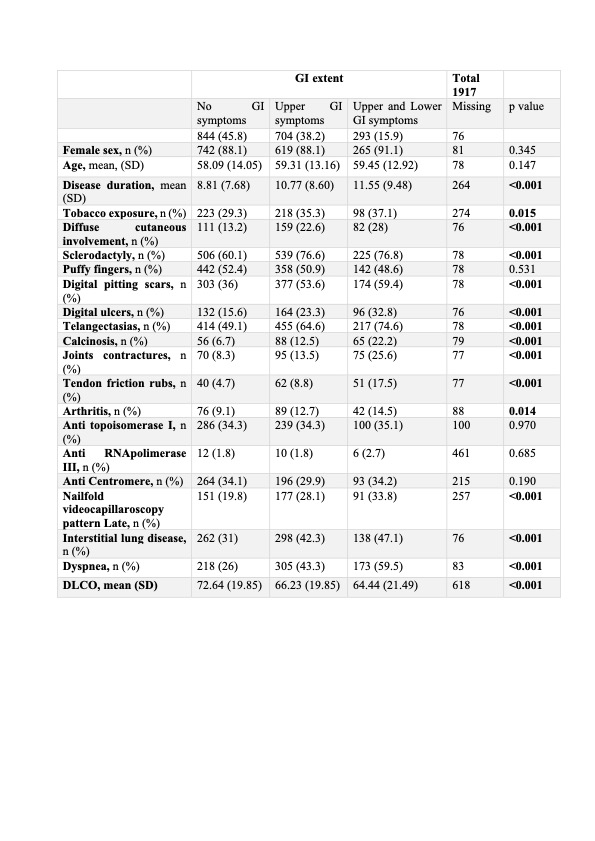Session Information
Date: Tuesday, October 28, 2025
Title: (2470–2503) Systemic Sclerosis & Related Disorders – Clinical Poster III
Session Type: Poster Session C
Session Time: 10:30AM-12:30PM
Background/Purpose: Gastrointestinal (GI) involvement affects over 80% of patients with systemic sclerosis (SSc), contributing significantly to morbidity and representing the third leading cause of disease-related mortality. Symptoms can affect any GI tract segment and often appear early in the disease course. To date, no disease-specific treatment exists, and management remains symptomatic. The underlying mechanisms are not fully understood, and the clinical course is highly variable.This study aimed to identify SSc endotypes associated with GI involvement, determine clinical predictors of GI symptoms, and explore the relationship between disease duration and GI manifestations using data from the SSc Progression INvestiGation (SPRING) registry of the Italian Society of Rheumatology.
Methods: Patients fulfilling the 2013 ACR/EULAR classification criteria and with available GI symptom data were included. GI involvement was defined by the presence of symptoms in at least one of the esophageal, gastric, or intestinal tracts. GI manifestations were classified as “upper GI involvement” (esophageal/gastric symptoms only) or “lower GI involvement” (intestinal symptoms regardless of upper GI symptoms). Chi-square and Student’s t-test were used for descriptive comparisons. Logistic regression was used to identify predictors of GI involvement; ordinal regression assessed predictors of increasing GI disease extent.
Results: Among 2178 patients, 1917 met inclusion criteria. Of these, 1073 (56%) reported GI symptoms. Patients with GI involvement had longer disease duration (p< 0.001) and more severe disease features, including diffuse cutaneous SSc (dcSSc), interstitial lung disease (ILD), and digital ulcers (DU) (all p< 0.001). Autoantibody status, sex, and age were similar across groups. GI involvement increased with longer disease duration, peaking in those with >12 years of disease (62.3%, Figure 1). Logistic regression identified telangiectasias, tobacco exposure, dcSSc, ILD, DU, and longer disease duration as independent predictors of GI symptoms.Patients with more extensive GI involvement (both upper and lower) had higher prevalence of severe disease markers, including dyspnea, lower DLCO, and telangiectasias (all p< 0.001, Table 1). Ordinal regression confirmed disease duration, female sex, ILD, DU, dcSSc, telangiectasias, and tobacco exposure as predictors of increasing GI extent. However, in a separate analysis focused on progression from upper to lower GI involvement, only DU, telangiectasias, and anti-centromere antibodies emerged as significant predictors, while disease duration was not.
Conclusion: A more severe SSc phenotype is associated with both the presence and the extent of GI involvement. Key independent risk factors include disease duration, dcSSc, ILD, DU, and tobacco exposure. While disease duration plays a central role in the onset of GI symptoms, it does not appear to drive progression from upper to lower tract involvement, suggesting different mechanisms for initiation versus extension of GI disease.
 Table 1. Comparison of demographical data and symptoms in SSc patients with different extent of GI involvement.
Table 1. Comparison of demographical data and symptoms in SSc patients with different extent of GI involvement.
.jpg) Figure 1. Stratification of GI extent according to disease duration.
Figure 1. Stratification of GI extent according to disease duration.
To cite this abstract in AMA style:
Bonomi F, Bruni C, Bosello S, Cacciapaglia F, Campochiaro C, Caporali R, Codullo V, D'Agostino M, Dagna L, De Angelis R, de Luca G, Giuggioli D, Guiducci S, Iannone F, Ingegnoli F, Montecucco C, Riccieri V, Ferri C, Matucci-Cerinic M, Bellando Randone S. Characterizing Gastrointestinal Involvement in Systemic Sclerosis: Insights from the National Systemic sclerosis Progression INvestiGation (SPRING) Registry of the Italian Society of Rheumatology [abstract]. Arthritis Rheumatol. 2025; 77 (suppl 9). https://acrabstracts.org/abstract/characterizing-gastrointestinal-involvement-in-systemic-sclerosis-insights-from-the-national-systemic-sclerosis-progression-investigation-spring-registry-of-the-italian-society-of-rheumatology/. Accessed .« Back to ACR Convergence 2025
ACR Meeting Abstracts - https://acrabstracts.org/abstract/characterizing-gastrointestinal-involvement-in-systemic-sclerosis-insights-from-the-national-systemic-sclerosis-progression-investigation-spring-registry-of-the-italian-society-of-rheumatology/
